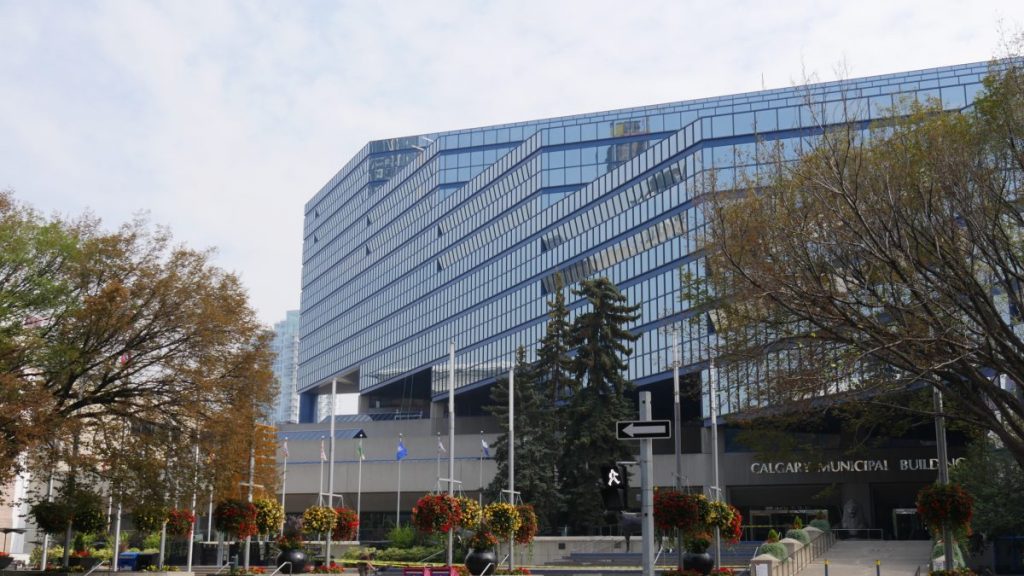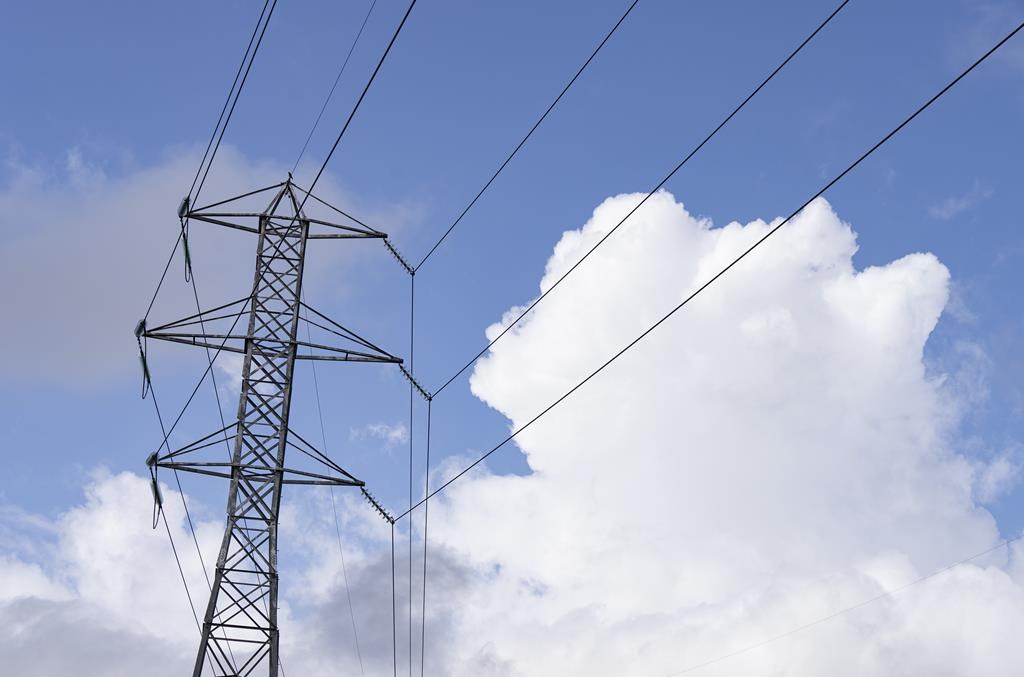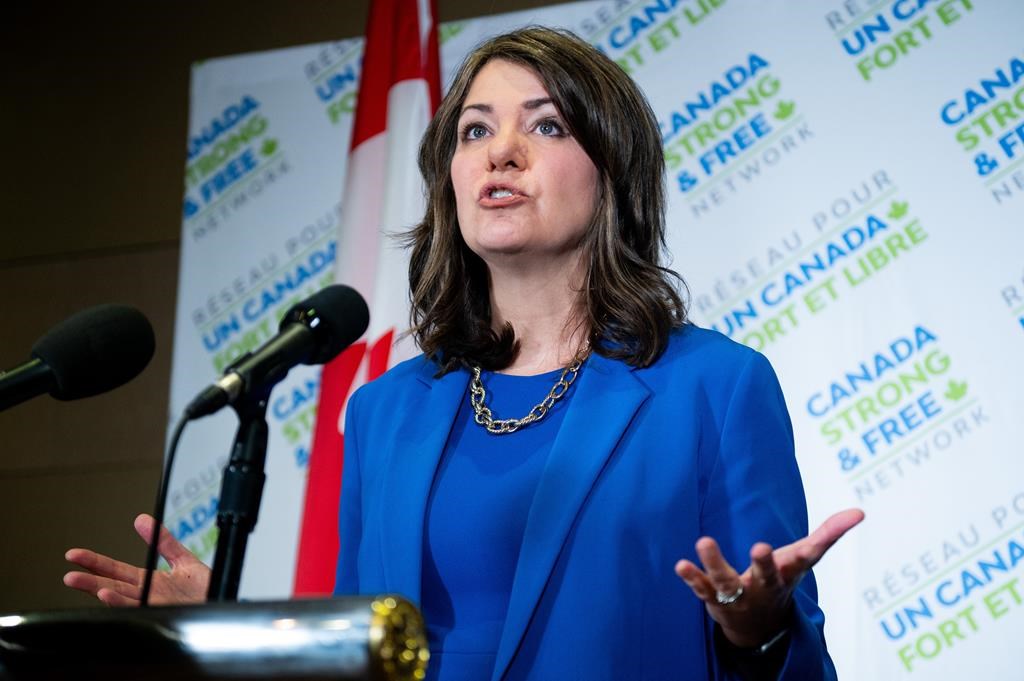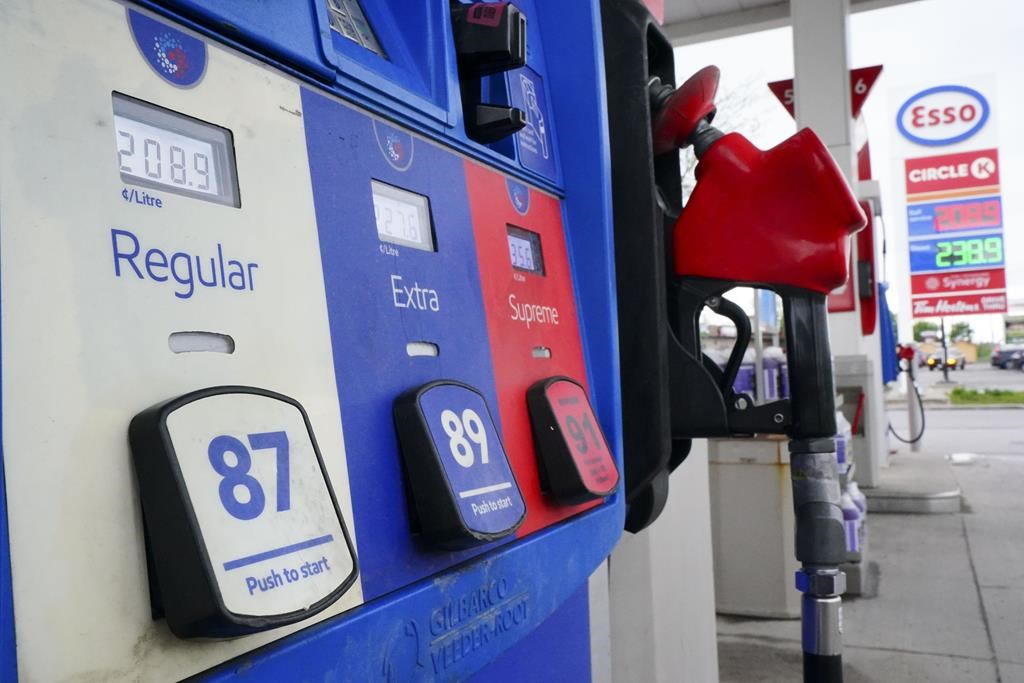Maclean’s: Rachel Notley fought like hell for Alberta, but the province isn’t about to thank her
Posted Mar 12, 2019 3:22 pm.
Last Updated Mar 12, 2019 3:43 pm.
This article is more than 5 years old.
CALGARY – The radio ad starts, like so many pickup truck commercials do, with a thudding guitar lick trapped in that netherworld between rock, blues and country. “When the going gets tough, Albertans don’t back down. We roll up our sleeves,” the voiceover begins. The companion TV spot, with the same music, opens more gruffly: “We’ll do it ourselves.” Bearded man in blue coveralls walks slowly and dons hard hat. Cut to archival industrial footage designed to swell blue-collar pride. As the announcer gravels on about pipelines, refining and oil processing—wait a second, this ad isn’t selling trucks. . . “The future is coming, and it’s made in Alberta,” the radio version concludes. “To learn more, visit Alberta.ca.
“A message from the government of Alberta.”
The NDP government of Alberta.
Rachel Notley didn’t come stomping into the premier’s office this way. Alberta voters, finally fed up after 44 years of Progressive Conservative rule, took a chance in 2015 on a genial labour lawyer—one who didn’t come across as too bolshie, but also not as an oil industry stalwart. If Alberta seemed a peculiar fit for NDP power, then came four turbulent, trying years: recession, soaring unemployment, oil price slumps and pipeline delays that thrust an already anxious populace into further hardship.
It’s all gone into production of the 2019-model Premier Notley. She’s ordered 4,400 railcars to haul Alberta oil that won’t fit into existing pipelines. She’s spent millions to plaster Canada with ads touting the benefits of pipelines, and more recently to persuade Albertans of her plan to shore up the energy sector. She’ll poke a defensive elbow or two at environmentalists, B.C. and Quebec, fellow NDP leaders Jagmeet Singh and John Horgan—and even the Trudeau Liberals, her erstwhile allies in reconciling environmental protection with economic growth. An early version of that truck-like TV ad starts: “If Ottawa won’t let us get full value for our resources, we’ll have to do it ourselves.”
This is Notley and her NDP on pre-election footing, polling well behind Jason Kenney’s United Conservatives and their more aggressive posture toward pipelines and anyone who dares not to advocate for them. She’s largely denied critics the opportunity to label her anti-pipeline, and perhaps it’s her best shot at regaining acceptance—Notley has taken the NDP’s old reputation for Prairie pragmatism and dunked it in oil.
READ: Rachel Notley on an economy that’s ‘being held hostage’, dealing with Trudeau and the next election
But there’s no sign yet that it’s working well enough to deliver her another victory this spring, unless the miracle of 2015 somehow repeats itself. The business community shows gratitude for her defence of the province’s key industry, but little resembling support. Progressives give her grief for trying to “out-Tory” the Conservatives, while the electorate as a whole seems to have moved on. (At press time, her party trailed the UCP by double digits in polls, as it has ever since Alberta’s right-leaning parties merged in 2017.) Notley takes every opportunity she gets to profess her love for her province, its people and its fossil-fuel economy. So far—at least when it comes to voting intentions—the goodwill largely flows one way.
Early on, Notley says she got “invaluable” advice on decision-making from Saskatchewan’s Roy Romanow and Manitoba’s Gary Doer, former NDP premiers who each won three terms. (She also recruited top staff from their teams, along with senior NDP hands from British Columbia and Ottawa.) Both kept moderate voters on board by governing from the centre—something Notley might reasonably have thought would work for her.
The daughter of a former Alberta NDP leader, Notley says she believes in having bedrock political principles but has strived to rigorously test assumptions. “I have been surprised by how, many times when you do that, you learn more and you change course,” she says in an interview. The NDP campaigned on reviewing oil royalty rates, convinced the public should reap more from energy companies. When the government’s expert panel said existing levels were competitive, Notley’s cabinet agreed—to the industry’s relief and the party base’s frustration.
READ: Alberta has never had a one-term government. Will Rachel Notley’s NDP be first?
Romanow, who entered office during a recession like Notley did, raised taxes and slashed government programs in the early 1990s; Notley hiked taxes on high earners and companies, but she cancelled the modest spending rollbacks the Tories proposed. When oil prices stayed low, there was little tax revenue from dwindling corporate profits; natural resource revenues plunged and budget deficits dashed the other way. New Democrats insist they can balance the budget by 2024 if the economy and royalties recover. And their reliance on the oil and gas budgetary roller coaster isn’t new, says Ron Kneebone, a University of Calgary economist: “They’ve behaved exactly the same way as PC governments behaved.”
Kneebone says they’ve more effectively contained health budget increases than in the past several years of Torydom, largely by reining in doctor fees. “But they don’t talk about it,” he says. “It’s almost as though they’re ashamed of showing some fiscal restraint.” NDP House Leader Brian Mason calls it an “unsung” accomplishment—unsung, perhaps, because the party has been howling that austerity under a Kenney-led government would wreak havoc on health care.
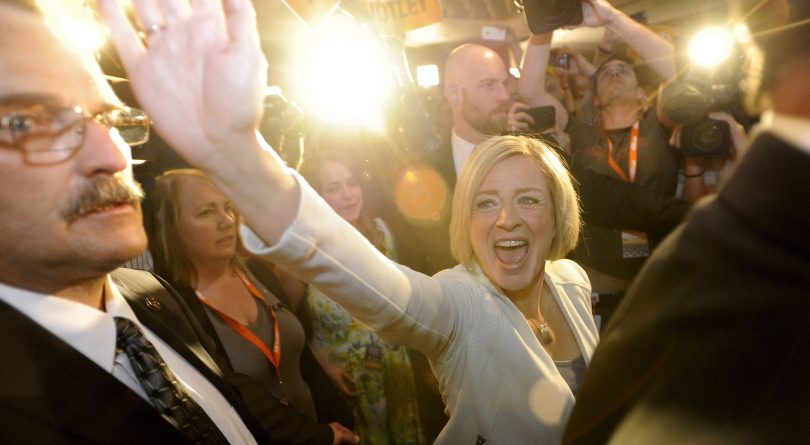
Alberta NDP leader Rachel Notley reacts to election results in Edmonton on May 5, 2015. (Dan Riedlhuber/Reuters)
Unlike other western provinces, Alberta had no tradition of voting NDP until the party’s surprise 2015 win, in which it quadrupled its traditional vote share and climbed to 54 seats from the previous four. Mason calls its first term “activist,” but one that brought Alberta up to speed with other provinces. “By and large, the government has not broken a huge amount of new ground,” he says. It boosted labour standards, brought in Canada’s first $15 minimum wage and created $25-a-day child care spaces—but a limited number, due to budget constraints.
Notley quashed perceptions she’d have an open-chequebook approach to labour bargaining by getting all major public-sector unions to accept zero increases. In renewed salary talks this year, she’s disappointed leaders by urging no raises again. “There’s nothing compelling [workers] to go to the ballot box with their head held high, marking an X for the NDP,” says Guy Smith, president of Alberta’s largest public-sector union. He wasn’t expecting a left-wing utopia, but he expresses surprise at how little has changed in some quarters; some of the top Tory-era bureaucrats, he laments, remain in place today.
Members of Alberta’s old NDP base describe a government whose approach ranges from cautious to timid. Outside the province, fellow travellers remark at how little Notley’s stance on the oil industry diverged from that of past governments, and how at odds it is with that of the New Democratic movement elsewhere. Charles Smith, a University of Saskatchewan political scientist who specializes in labour issues, recalled one staunchly pro-NDP colleague’s observation: “ ‘Rachel Notley’s the best Progressive Conservative premier Alberta ever had.’ ”
Where change came, it sometimes proved rocky. When they were in opposition, Alberta New Democrats wondered why the Tories never added farm workers to workplace safety legislation, like elsewhere in Canada, but quickly learned the answer: raucous agrarian backlash to the proposal, handing Notley one of her first crises and leaving the government consulting away the anger as the changes went through. Polls and party insiders alike suggest rural Alberta remains hostile territory for the NDP.
Rivals learned to exploit the sense that the NDP were Green Acres-like tourists to the conservative Alberta countryside. Last year, Environment Minister Shannon Phillips promoted a local green challenge that encouraged people to take shorter showers and “eat less meat.” Kenney rebroadcasted the tweet, prompting beef ranchers to seethe that the NDP had attacked their industry. Phillips pledged government support for beef, expressed regret and blamed an aide for sending the tweet.
READ: Rachel Notley and the upside down world of Alberta politics
Notley sought to curry favour with businesses by halving the small-business tax rate, but that didn’t impress, either. Some chambers of commerce are demanding the next government undo other NDP reforms. “Rising and layered costs such as corporate taxes, carbon taxes, minimum wage increases and labour law changes have all been piled on businesses at the very worst time,” Sandip Lalli, head of the Calgary chamber, told a January news conference. In an interview, Lalli says her group doesn’t oppose the NDP, but she worries they haven’t appreciated the harm their policies have done.
Openly opposed or not, corporate leaders traditionally view New Democrats with suspicion. On the eve of the last election, five Edmonton business figures—all Tory donors—held a news conference to warn voters about the party’s policies. Four years later, corporate lawyer Doug Goss says the government put in “socialist policies” that hamstrung the economy. “I’ve heard a lot of people say: dammit, you were right,” he says. The party has won praise from one of those five businessmen—New Democrats privately call them “Monopoly men”—but support came at a cost and was far from full-throated. Venture capitalist Ashif Mawji appeared last fall alongside a Notley minister at a tech-sector program announcement, and later hailed the NDP’s bolstered support for artificial intelligence. “They’re listening, and that’s the only thing you can ask for . . . and be open to change,” Mawji tells Maclean’s—but only after he criticizes the government’s tax increases.
The day after her victory, Notley expressed hope that nervous energy-sector executives would realize “things are going to be just A-okay” in Alberta. The royalty review turned out that way for industry. And when she announced a climate change plan that featured a carbon tax and an oil sands emission cap, four oil sands executives joined the premier onstage, calling it a “sensible” and reputation-boosting “step forward.” But NDP energy policies have faced criticism elsewhere in the sector—from a segment “that is simply very partisan in the way they look at everything,” says Dave Collyer, former head of the Calgary-based Canadian Association of Petroleum Producers. Others, whose short-term struggles have made it hard to take a long-term view, begrudge the costs of new regulation. But Collyer counts himself in the group that considers the NDP’s energy policies fairly balanced: “This government has done a pretty good job, given the hand it’s been dealt.”
Had the Tories won again, some climate-change moves may not have been different. Jim Prentice, whom Notley supplanted as premier, backed a phase-out of Alberta coal power plants, just as she did. And in a posthumously released book, he advocated for carbon taxes—heresy for Canadian conservatives today, chief among them Kenney.
In Prentice’s unsuccessful election run against Notley—“this is not an NDP province,” he declared with days to go—he bashed her for half-hearted support of pipelines. The NDP leader had vowed to cease Alberta’s lobbying efforts in favour of Keystone XL to Nebraska and Northern Gateway to the B.C. coast. But she favoured the expansion project along the existing Trans Mountain corridor to Burrard Inlet.
Notley won a majority government with that position. Four years later, no major Alberta party dares offer anything less than stout advocacy for pipelines in every direction.
Early in her term, Notley found it sufficient to express hope for “at least one” major pipeline to a seaport, if others got stymied by government, protest or market forces. The day Justin Trudeau announced cabinet’s rejection of Northern Gateway, the premier focused on celebrating its simultaneous approval of the Trans Mountain expansion. As time wore on, Alberta’s economic downturn, myriad project setbacks and a gathering bottleneck of oil supply added to the growing urgency for progress on pipelines—certainly in this NDP premier’s office.
READ: The real reason for Doug Ford and Jason Kenney’s anti-carbon tax crusade
Notley tells Maclean’s that she’s developed a better understanding of Alberta’s pipeline capacity issue, and that Trans Mountain isn’t the only pipeline that needs to be built. “I’ve learned more about the industry,” she says. “I would say I’m a bigger supporter now of making sure that we get pipeline infrastructure in place. It’s safer.” She then repeats a well-worn line from conservative politicians and industry spokespeople: It doesn’t make sense for eastern Canadian refineries to buy Saudi and Russian oil when there’s a domestic glut.
Opposition parties were long fond of tying Notley to her party’s past swipes at “tar sands” development and pipelines. But their attacks lost currency at the start of 2018. That’s when Horgan, Notley’s NDP counterpart in B.C., announced plans to somehow restrict bitumen flows from Alberta. In response, Notley briefly banned B.C. wine imports to her province, then passed legislation allowing Alberta to punitively cut off the West Coast’s oil supply if there were further provocations. The move, which if enacted would send B.C. gas prices soaring, had oil industry leaders in Alberta pounding the tables in approval. “She has shown some incredible leadership on this file,” Mark Scholz of the oil well drillers’ association told an energy forum in Red Deer, Alta.

United Conservative Party leader Jason Kenney speaks in Edmonton on Jan. 29, 2018. (Jason Franson/CP)
Her “turn off the tap” legislation was, in fact, an idea borrowed from Kenney—one Notley had initially mocked as Trumpian. Smith, the political scientist, says Notley has had to respond for much of her term to oil stances Kenney has taken. If her on-the-job education partly explains the tougher stance, more of it is likely due to intense political rope-tugging: Kenney has pulled her to the right, while other NDP leaders have pushed her away from the left.
To Notley, the NDP tensions are part of a long-standing debate within the party that she casts as one between workers’ ability to put food on the table and “longer-term, sort of academic-y concerns around environment.” She tackled it early on as premier, at the 2016 federal NDP convention, when she forcefully decried the Leap Manifesto’s opposition to all oil pipelines. Subsequently, Singh has opposed the Trans Mountain expansion, adding him to the list of NDP heavyweights with whom she has little or no relationship, and whom she occasionally derides.
Tzeporah Berman, a long-time B.C. environmentalist, says she had early hopes for Notley’s NDP, and was encouraged by the climate plan. Keen to bring together environmentalists and oil leaders to smooth out the pipeline debate, Notley named Berman co-chair of an oil sands emissions advisory group, alongside Collyer and a northern First Nations leader. Conservative opponents had a field day bashing Notley for giving such an influential role to an anti-pipeline crusader. Ultimately, the premier herself would wind up taking thinly veiled potshots at Berman. “In Alberta, we ride horses, not unicorns,” Notley said at a teachers’ conference at which Berman was also slated to speak.
From the rhetorical swipes to regulatory concessions for oil companies to the pro-pipeline advertising spree, Berman says she didn’t expect this. She points to the NDP government’s online ads and memes: “You could take the label off and it would be the same thing you see from Kenney or the Harper government, and that’s truly shocking.” Even if it’s been said before by Notley’s political opponents, there’s special impact when it comes from someone like her, Collyer says. “If a conservative premier stepped up and said the same thing, that sort of fits the profile—that’s what you expect them to say.”
Notley claims credit for bringing national support for the Trans Mountain expansion above 60 per cent, compared to around 40 per cent a couple of years ago. She also maintains her climate policy got Trudeau onside with it in the first place, and that she urged the Liberals to buy the beleaguered project last spring. “From day one, this has been our strategy: to bring Canadians along with us, not to divide them,” Notley told reporters in February. Yet that’s the best case she can make for achieving anything on pipelines. Thanks to last summer’s Federal Court of Appeal dismissal of the project approval, Notley will face voters without being able to clarify when, if ever, Trans Mountain will be built.
Left-leaning Albertans, meanwhile, question the political wisdom of the NDP’s hard play on pipelines. “I don’t know if anybody looks at those ads and thinks, ‘I’ve been wrong about the NDP all these years, and they are just like us,’ ” says Ricardo Acuña, director of the progressive Parkland Institute. Notley’s mixture of swagger and consensus-building efforts stands in contrast to Kenney’s guns-blazing plan that includes various legal and legislative attacks on Ottawa, anti-pipeline provinces and environmental groups. After years of Notley’s approach, Albertans appear keen to try something else: a February survey by Janet Brown Opinion Research suggests that 57 per cent are confident in Kenney’s ability to get pipelines built (though the decision’s a federal one); only 36 per cent feel the same way about Notley. Underlying that may be suspicion that her Alberta NDP colleagues don’t share her passion on the issue. “The premier has been quite compelling, but I don’t think below her there’s desire to see pipelines built,” says George Brookman, a prominent Calgary printing company owner.

Alberta Premier Rachel Notley visits Inter Pipeline’s Heartland Petrochemical Complex in Fort Saskatchewan, Alta., on Jan. 10, 2019. (Jason Franson/CP)
Notley’s adoption of pipeline advocacy came too late to matter much, says UCP deputy leader Leela Aheer. “The problem is you can shift all you want at this point, but there’s been so much damage done in terms of the other pipelines that could have been built,” she says. By late 2018, Alberta’s oil supply bottleneck was so dire, and market prices for bitumen so depressed, that even free-market-loving Kenney encouraged Notley’s decision to force the province’s oil producers to throttle output. She also had industry support for further government intervention: a plan to acquire railcars for shipping excess oil supply. (Kenney now vows to shred that contract if he wins.)
Yet it’s become clear that pipeline advocacy alone won’t deliver Notley re-election—not when her rival offers a stronger flavour of the same dish. The NDP will fight the double-digit poll leader with steady hits on Kenney’s character and social conservatism, and with repeated threats that his UCP would eviscerate public health care and social services.
Unless Kenney’s support craters, the NDP can at best hope to place a strong second and stave off the sort of blowout common during the Tory dynasty days. Even that could be an uphill battle, given polls consistently showing Notley’s party trailing by 15 to 25 points. To their credit, the NDP has retained about three-quarters of its support from its surprise victory, heading off the provincial Liberals and upstarts like the centrist Alberta Party—something that may have been impossible if Notley was the only leader soft on pipelines. It’s the sort of thing that might stave off the fate of other recent first-time NDP governments, like Bob Rae’s 1990 Ontario government and Darrell Dexter’s in 2009 in Nova Scotia, which both clunked to third place when they went back to the polls.
Their struggles are also leavened by Notley’s relative popularity; she’s their best asset, a person even critics praise as knowledgeable and sincere. “You can’t help it; she’s a force,” Aheer acknowledges. The party’s early election placards may have the letters N, D and P on them, but seldom arranged in order—her name is the brand. You could say she’s the face of a pragmatic, pro-pipeline Alberta NDP, but that’s probably not doing her justice. Put all the descriptors on her shoulders: Rachel Notley’s the pragmatic, pro-pipeline face of a party she’s about to carry across the finish line—if not in victory, then at least in survival.


